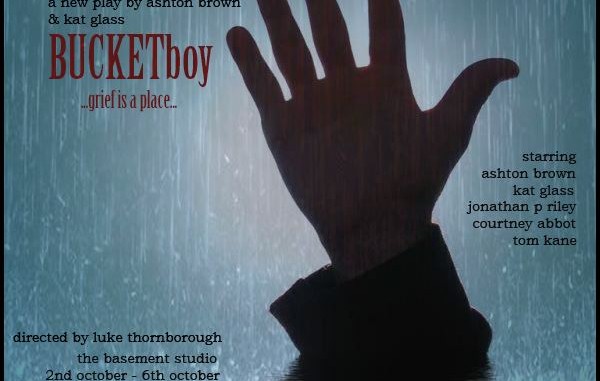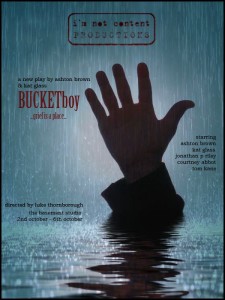
There’s more than one hole in it [by Matt Baker]

After a 30-minute delay due to technical difficulties, we were finally ushered into the Basement loft, but not before being told that we were about to see the ‘greatest show of our lives.’ It was a bold and conceited statement, and one to which the show does not live up.
Written by and starring Ashton Brown and Kat Glass, and produced under their joint-venture I’m Not Content Productions, this degree of involvement has predictably and quite evidently reduced any chance of objectivity towards the production. Luke Thornborough is attached as director, however, the lack of shape in the narrative and emotional journey makes me question how much he really brought to the project.
Bucket Boy has two fundamental flaws. Firstly, the world that the writers have created is unstable – and not in the way they intended. Predeterminism, free will, and metaphysics are concepts that have a solid foundation in philosophical academia, but to incorporate these ideas into a world that is not our own, and has its own laws that have been created for a play, means that any rules or guidelines of these subject matters lose validity. An example is the fact that the supporting characters develop throughout the narrative, despite the fact that they are supposed to be in a continuum. This immediately invalidates the concept that they are victims of fate. In particular, Courtney Abbot, as neighbor Phoebe, has a complete change of character in her third act. While this does give her an opportunity to play (some) pathos, which is nicely weighted, it disputes the logic of the play. Secondly, it is difficult to empathise or even sympathise with the protagonist. Brown is not a charismatic actor. He fails to find any shade to his character and resorts to roaring around the stage or huddling in a corner, and he has no clear thought processes or organic reactions.
As girlfriend Rebekah, Glass delivers a lot of lines, but rarely says anything. Jonathan P. Riley has some strong elements of character, but his unnecessary accent and yelivery (yelling-delivery) result in most of his dialogue going unheard. Tom Kane, as John the psychologist, is the most difficult to critique. On one hand, his portrayal is hampered by stereotypical writing and illogical actions. On the other, he has the strongest points of view. Likewise, his emotional journey is both unbelievable, yet performed with a nice degree of catharsis. The voice over narration is pleasantly spoken by Simon Clarke, even if its use seemed a cop out to keep the audience up to speed – and was occasionally played in the wrong place.
The lighting design by Michael Forkert was either too subtle, actors occasionally fell into side shadows, or ludicrously exaggerated, a strobe light sequence and later some green and red spots were thrown in, just, because. The set (designed by Thornborough and Sam Mence and constructed by the latter and Peter Mence), while original and not without potential, caused problems. APRA approved indie music was appropriate, as was the original score composed and performed by Jonathan Barnard, though, as with the lighting, it was sporadic and failed to create an overall aesthetic. Operators Camille Rees and Ruby van Dorp, lighting, and sound and AV respectively, needed at least two more tech runs before opening night.
Add to this the fact that the play, at 90 minutes, is at least half an hour too long, and one can only conclude that Bucket Boy is problematic at every turn. It feels as if Brown and Glass have done the first semester of Philosophy 100 and taken an online scriptwriting course, and decided to write an unsolicited thesis in the form of a play using Wikipedia as their one and only reference tool. Not only is the core concept of the play flawed, the writing is incredibly messy. Even putting aside the repetitious scenes, characters seem to have only one argument. Their dialogue is muddy, unnecessarily repetitive, there are no clear voices, and occasionally they say nothing more than a palindrome of their previous point. The myriad of problems continues not only in the characters’ points of view, but the logic of the plot. Why did Noah think he had to go and meet Rebekah on the first day of repetition if he naturally thought that day had passed, especially considering the way the day ended? Why did he wait over a month before meeting the psychologist if the offer was there the whole time? Who made the appointment with the psychologist? What kind of psychologist divulges personal information to his clients? Why did the psychologist call him bucket boy? Why did Noah have bucket boy written on his clothes? Why didn’t he just walk away from Tim? Why was Noah suddenly wearing pants when he awoke on day 96? I could go on, there was something askew nearly every thirty seconds, but I find that every question simply comes back to bad writing, and, even if Brown and Glass have answers to each of them, which I highly doubt, it should not be this difficult for me as an audience member to simply understand the basic plot and actions of the play. The real work should come from the message it sends. Grief. Presented in the limited forms of anger and sadness. Which stems from bad writing. I feel like I’m stuck in my own continuum.
Bucket Boy is presented by I’m Not Content Productions and plays at The Basement Studio until 6 October. Details see The Basement.




Leave a Reply